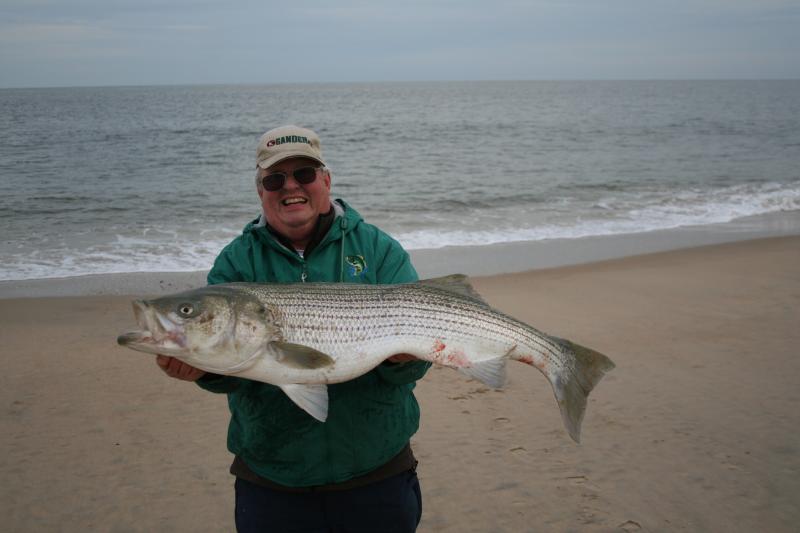Fishing season off to a slow start
Boy, talk about a slow start to a fishing season. This year seems to be mired in molasses! They are catching big striped bass in New Jersey and black drum out of the Assateague surf while we have to settle for tiny tog and short rockfish at Indian River Inlet. Even this past week, when air temperatures finally went above 60 degrees, it rained just about every day. I do know for a certainty that sooner or later the weather will change, the water will warm and we will see some fish in the surf.
What we surf fishermen must be aware of is the type of bait that will come to the beach and what type of fish will come in after it. As I mentioned last week, there is an abundance of menhaden in Delaware Bay, and there are lots of rockfish feeding on this bait. The question is, will the menhaden come on down the beach or will the large schools remain out of casting range? If the bait comes in range, we will see some big rockfish caught from the beach.
I have experienced this wonderful event once in Delaware. I used a fish-finder rig with a chunk of bunker on an 8/0 circle hook to catch a 36-inch rockfish. Lloyd Purcell, fishing next to me, had a 44-inch rock on the same type of rig. Both baits were snagged by casting weighted treble hooks into the schools of menhaden.
There is a technique by which you can cast a weighted treble hook into a school of menhaden, let the snagged bait sink and hook a rockfish. This is now illegal. Only non-offset circle hooks are legal when fishing with bait for striped bass.
If I get the chance this year, I am going to try casting plugs for rockfish. I went a little nuts in New Jersey at the two shows I attended, buying the latest plugs including what they call glide plugs or walk-the-dog models. I also picked up two jointed plugs in sizes and colors that match the size and color of the bunker we get here. Those added to my already-large arsenal of plugs collected over the years, and I should be ready for whatever comes along.
Once the striped bass run is over, it will be back to bait and wait, or Delaware’s normal surf-fishing technique. I use two surf rods – one is set up with a top-bottom rig baited with FishBites bloodworm or sand flea. Here, I use a bank sinker.
The second outfit carries a single-circle hook with Gulp! swimming mullet, crawfish or five-inch Fishbites Dirty Boxer Curly Tail. This rig carries a tongue sinker.
I have some floating rigs that I bought from Lewes Harbour Marina made by Tin Man lures that I want to try this spring. They were donated for the Joe Morris Memorial Canal Flounder Tournament that will be held Friday, May 20. All sales of the rigs go toward Pancreatic Cancer Support.
The top-bottom rig I do not leave in my sand spike. I keep it moving across the bottom. Once I have made my cast, I let the rig get settled for a few seconds, then start a slow crank toward the beach. I will crank in a few yards, wait for 30 seconds or a minute, then crank in another few yards. This technique will slow down the damage done by crabs and allow you to cover the bottom all the way back to the wash. When you do catch a fish, you will have some idea where your bait was and can be ready for another bite when the rig gets in that neighborhood again.
Another trick to try is casting a bucktail with a Fishbites Fight Club Five-inch Dirty Boxer Curly Tail or a Gulp! swimming mullet out into the surf. You want to work this lure right back to your feet, as flounder will often feed right in the wash.
When most people think of surf-fishing, they picture the beach with big waves crashing on the sand. Well, don’t forget Broadkill Beach in the spring. It produces rockfish, big black drum and, if there are any around, trout. It has been an open secret forever, but a few years back, there was a uproar because an angler caught the largest rockfish of his life there and had the audacity to put his catch on social media. This grabbed the attention of a couple of children who thought they owned Broadkill Beach and accused the guy of spot burning. It took a couple of adults to put the children in their place and congratulate the lucky angler on his fine catch. Trust me, there are no secret spots along the Delaware shoreline.






















































